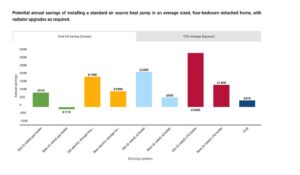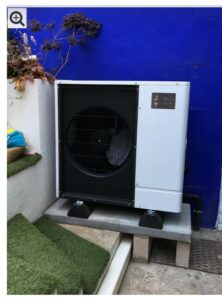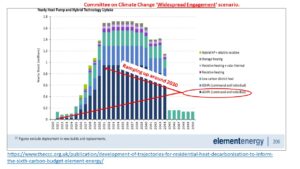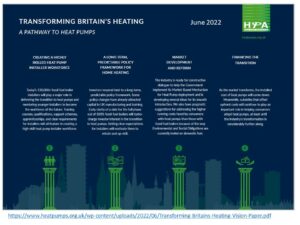The big switch from gas boilers to air source heat pumps is underway!
The Boiler Upgrade Scheme – Ofgem has now started accepting £5K vouchers for the purchase and installation of Air Source Heat Pumps – backdated for installations from 1st April 2022, so long as the installer was registered to receive these vouchers. The scheme is called the ‘Boiler Upgrade Scheme’ (although ‘Heat Pump installation Scheme’ would be a better description!)
This is the first step the UK Government is taking to get homes (and small businesses) heated by an efficient electricity source rather than by high carbon gas boilers. Gas boilers are responsible for air pollution in homes too, causing ‘tens of thousands of early deaths a year in the UK’ (Guardian 29/09/21), so switching is better for your family as well as the planet.
So what do you need to know about Air Source Heat Pumps and the BUS scheme?
What is an air source heat pump?
The Energy Saving Trust explains how they work
Gas is a fossil fuel building up a blanket of greenhouses gases destroying our precious planet. Air source heat pumps use about a quarter of the kWhs to heat your home and hot water, so, particularly where the electricity is from renewable sources, air source heat pumps cut your carbon footprint significantly.
The official guidance for property owners is at BUS Property owner guidance (ofgem.gov.uk) The scheme is open to individual or company property owners including landlords, second home owners and small businesses – only limited by (high) heat output limit. New builds are only eligible if the owner owned the land before the build (“self build”) and is an individual not a company. Other new builds and social housing are not eligible for the BUS scheme, as they are subject to other schemes. Ground source heat pumps are also eligible and get a £6K discount, but they cost more and require significantly more land. Note biomass boilers are eligible, but only in rural areas.
Common questions
Octopus Energy is being proactive in boosting the air source heat market and CEO Greg Jackson busts many myths surrounding air source heat pumps – such as too expensive, too noisy, too much disruption etc in this video:
Steps to check out an air source heap pump 'boiler upgrade' If the answers to these questions lead you to be interested in an air source heat pump follow these steps:
Step 1 – talk to installers.
(See below re industry installer issues.) Finding an installer you trust and is willing to consider your job can be a challenge. And there can be a led time of months to source heat pumps – hence the need to look into heat pumps BEFORE your boiler dies. To get the BUS voucher the installer needs to be registered with Ofgem, as well as being MCS registered. To find an installer try:
- The MCS find a contractor page
- The Renewable Energy Consumer Code (RECC) list of members
- The HIES Accredited Member List
- The Muswell Hill Sustainability Group’s list Green Installers that members have used
There is no public list of installer who are registered with Ofgem to handle Boiler Upgrade Scheme vouchers – so the first thing to check is that the installer is registered to handle BUS vouchers.
Step 2 – check your EPC
The property must have an Energy Performance Certificate (EPC), less than 10 years old and with no outstanding recommendation for loft or cavity insulation. Your EPC will be here with a post code search. There are many sales channels that direct you to qualified EPC providers, but you can ask the installers you are considering to put you in touch with one they work with.
If your EPC recommends Loft or Cavity Wall Insulation you must get this done before being eligible for the BUS £5K and would then have to get another EPC done that no longer requires these.,
Your EPC might recommend other measures to reduce your carbon emissions. Any of these that reduce heat loss are worth doing if possible eg double glazing, whether or not you proceed with an ASHP, because that will reduce heating bills and carbon emissions. See CSE link at further references.
Step 3 – get 2 or 3 installers to quote.
Study the quote. Check that the £5K BUS grant has been deducted. Check the suggestions for radiator replacement carefully and whether you are happy with the position of the ASHP and cylinder. Check that the quote includes a good method of removing the condensate water that flows from the base. Consider the opportunity for smarter controls to set your required temperature and standard hours of operation for hot water and heat (such as Hive etc)
Step 4 – your installer will manage the process
Your chosen installer will apply to Ofgem for a BUS voucher and Ofgem will write to you to confirm that you plan to have the work done and that you are willing to allow an audit inspection if required.
So, if you own a property with a boiler that might not last too long how to go about getting an air source heat pump with £5K off?
Now is the time to get active before a winter (of discontent), because there is shortage of qualified Air Source Heat Pump engineers and a long lead time for the Air Source Heat Pumps themselves. The BUS scheme is first come first served within the budget, so, if your boiler might break down any time soon, the sooner the better.
The Tom Kiss case study
The case study here is for an installation at a terraced Victorian house one year on. Be aware that the installation is receiving ‘RHI’ payments from Ofgem that have been replaced with this ‘Boiler Upgrade Scheme’ since April 2022.
And see a variety of case studies at the Heat Pump Association web site here.
Decarbonising the UK’s heat
Are there Co-benefits when we switch to ASHP?
One benefit is the reduction in health problems caused by (particularly old) boilers. There is also a value from being able to harness flexibility to programme heat and hot water production when there is plenty of low carbon electricity, and to produce less when there is a shortage – reducing the need for standby power ‘when the wind isn’t blowing and it is dark’. The Carbon Trust/Imperial College report on this has projected a value from flexibility of £16.7bn per annum by 2050.
Further References
Retrofit Advice from the Centre for Sustainable Energy – https://www.cse.org.uk/news/view/2687
Timeline for no more new gas boilers after 2025 – Heat Pump Association – https://www.heatpumps.org.uk/no-new-conventional-gas-boilers-in-homes-after-2025/
A Heat Pack for domestic consumers from the UK Power Networks – https://innovation.ukpowernetworks.co.uk/wp-content/uploads/2022/02/UK-Power-Networks-Heat-Pack-Domestic-Consumers-February-2021.pdf





